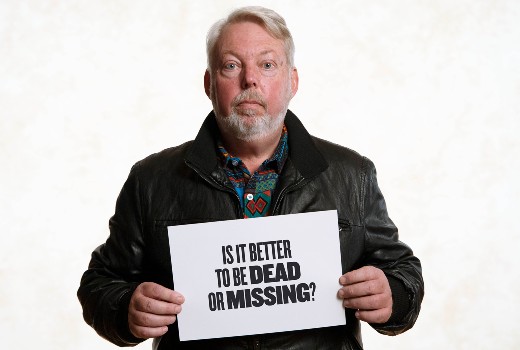by Sandra Moon This article was updated on April 11, 2023. It discusses Australian missing persons.

Imagine one day your loved one doesn’t return home and as time goes by there is no conclusive evidence that they are dead.
According to the Missing Persons Advocacy Network’s Missing Person’s Guide this is what occurs for around five percent of families of Australian missing persons. Without closure people are left to wait, to search, to be hopeful and to bear the uncertainty of ambiguous loss and disenfranchised grief.
Many families find themselves with no place to grieve as discussed by Bruce Morcombe on season six of the ABC’s You Can’t Ask That episode on Missing Persons. Mr Morcombe’s thirteen-year-old son Daniel went missing in 2003 and he and his wife Denise have since established the Daniel Morcombe Foundation aimed at keeping children safe.
While Mr Morcombe went to all four of the known sites associated with Daniel’s disappearance there was nowhere to go to grieve.
“You don’t have a gravesite,” he said. “You have nowhere to go.”
The need for a site to grieve has been recognised by the Australian Federal Police (AFP) National Missing Persons Coordination Centre (NMPCC) as one way to assist families with missing loved ones. May 25 was International Missing Children’s Day and the centre planted a commemorative tree at the Canberra National Arboretum dedicated to all missing children and their families.
Mr and Mrs Morcombe spoke of the importance of the tree.
“This commemorative tree is significant for police, family and friends because it’s a dedicated place to symbolically resolve to continue the search to find the missing children,” said Mrs Morcombe.
Bruce added: “We had no idea what had happened to him (Daniel) and we also had no place to reflect, honour and remember him.”
Mr Morcombe and other participants in You Can’t Ask That answered the question “Is it better to be missing or dead?”
Participant Peter Sydney, whose partner went missing, said that giving up hope feels as though you are giving up on the person. Sasoon Simonian, whose brother is missing, said that people who have evidence or answers have expressed to him that they miss the days when they had hope.
Fionnula Maye’s response was simply that it would be better if her sister Niamh was home. The show’s participants have gone through the same worries, including considering all the unnerving possibilities. It is a grief like no other.
With this disenfranchised grief and ambiguous loss in mind the AFP NMPCC have also released a national counselling framework Supporting those who are left behind. The resource was developed in response to a gap in the counselling model – it helps health practitioners and professionals to address the unique and specific needs of families who are left behind.
This includes helping people to support each other, search for their loved one and manage media opportunities.
While currently grief support is available, it does not consider the long-term ramifications of never gaining closure when a loved one’s location remains unknown. The framework states that health professionals must help people move forward rather than the almost impossible task of moving on.
Readers wanting to explore more on support for families of Australian missing persons can visit supporting those who are left behind.
To watch the ABC episode of You Can’t Ask That on Missing Persons click here.
If you have been affected by the loss of a missing person refer to the Missing Persons Advocacy Network’s Missing Persons Guide and the Family and Friends of Missing Persons Unit.
And finally let’s dip back in the Good Grief 2018 archives for a helpful article from Margaret discussing the delicate balance of sorrow and growth.
